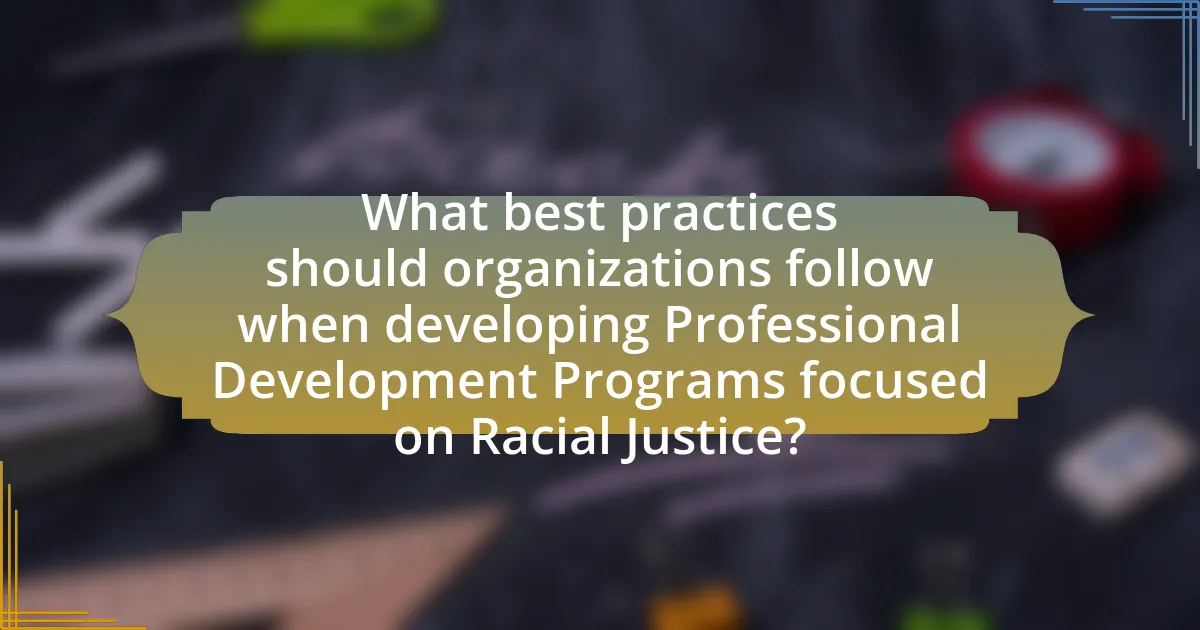Professional Development Programs focused on racial justice are structured initiatives aimed at educating individuals and organizations about systemic racism and promoting inclusive practices. These programs typically involve workshops and training sessions that address topics such as implicit bias and anti-racist strategies, with the goal of fostering equitable environments. Key principles guiding these programs include equity, inclusivity, and community engagement, which translate into actionable strategies for effective implementation. The article explores the importance of racial justice in professional development, the impact of racial injustice on workplace dynamics, and the expected outcomes from successful program implementation, while also discussing best practices and resources for organizations to develop and sustain these initiatives.

What are Professional Development Programs Focused on Racial Justice?
Professional Development Programs focused on racial justice are structured initiatives designed to educate and empower individuals and organizations to address and combat systemic racism. These programs typically include workshops, training sessions, and seminars that cover topics such as implicit bias, cultural competency, and anti-racist practices. Evidence of their effectiveness can be seen in studies showing that organizations implementing such training report improved workplace diversity and inclusion, as well as enhanced employee engagement and satisfaction.
How do these programs address issues of racial justice?
These programs address issues of racial justice by providing targeted training that raises awareness of systemic inequalities and promotes inclusive practices. For instance, they often include workshops on implicit bias, anti-racism strategies, and culturally responsive teaching methods, which equip participants with the tools to recognize and combat discrimination. Research indicates that professional development focused on racial justice can lead to measurable changes in educators’ attitudes and behaviors, thereby fostering a more equitable environment for all students.
What key principles guide the development of these programs?
Key principles guiding the development of professional development programs focused on racial justice include equity, inclusivity, and community engagement. Equity ensures that all participants have access to the same opportunities and resources, addressing systemic disparities. Inclusivity fosters an environment where diverse perspectives are valued and integrated into the learning process. Community engagement emphasizes collaboration with local stakeholders to ensure that the programs are relevant and responsive to the needs of the community. These principles are supported by research indicating that effective professional development must be contextually grounded and participant-centered to achieve meaningful outcomes in racial justice initiatives.
How do these principles translate into actionable strategies?
The principles of developing professional development programs focused on racial justice translate into actionable strategies by implementing targeted training, fostering inclusive environments, and establishing accountability measures. Targeted training involves creating workshops that address specific racial justice issues, such as implicit bias and systemic racism, which can be supported by research indicating that such training improves awareness and reduces discriminatory behaviors (Devine et al., 2012). Fostering inclusive environments requires organizations to actively promote diversity in hiring and leadership roles, as studies show that diverse teams enhance creativity and decision-making (Page, 2007). Establishing accountability measures includes setting clear goals and metrics to evaluate progress in racial equity initiatives, which is essential for ensuring sustained commitment and transparency, as evidenced by organizations that have successfully implemented such frameworks (Kalev et al., 2006).
Why is racial justice important in professional development?
Racial justice is important in professional development because it fosters an equitable workplace that enhances employee engagement and productivity. When organizations prioritize racial justice, they create an inclusive environment that values diverse perspectives, leading to improved collaboration and innovation. Research indicates that companies with diverse teams are 35% more likely to outperform their competitors, highlighting the tangible benefits of racial equity in professional settings. Furthermore, addressing racial disparities in professional development ensures that all employees have equal access to growth opportunities, which is essential for building a fair and just workplace culture.
What impact does racial injustice have on workplace dynamics?
Racial injustice significantly disrupts workplace dynamics by fostering an environment of mistrust and disengagement among employees. This disruption manifests in decreased collaboration, lower morale, and increased turnover rates, as individuals from marginalized racial groups often feel undervalued and excluded. Research indicates that organizations with high levels of racial injustice experience a 50% increase in employee turnover, as reported by the Harvard Business Review. Furthermore, racial injustice can lead to a lack of diverse perspectives in decision-making processes, ultimately hindering innovation and productivity.
How can addressing racial justice improve organizational culture?
Addressing racial justice can significantly improve organizational culture by fostering inclusivity and enhancing employee engagement. When organizations actively promote racial equity, they create an environment where all employees feel valued and respected, leading to increased morale and productivity. Research indicates that diverse teams are more innovative and make better decisions, as they bring varied perspectives and experiences to problem-solving. For instance, a McKinsey report found that companies in the top quartile for racial and ethnic diversity are 35% more likely to outperform their peers in terms of financial returns. This correlation suggests that prioritizing racial justice not only benefits individual employees but also drives overall organizational success.
What are the goals of developing these programs?
The goals of developing professional development programs focused on racial justice include enhancing awareness of systemic inequalities, equipping individuals with tools to promote equity, and fostering inclusive environments. These programs aim to educate participants about the historical and social contexts of racial issues, thereby encouraging critical reflection and dialogue. Research indicates that effective training can lead to measurable changes in attitudes and behaviors, ultimately contributing to a more just and equitable society.
How do these goals align with broader social justice movements?
The goals of developing professional development programs focused on racial justice align closely with broader social justice movements by promoting equity, inclusion, and systemic change. These programs aim to address and dismantle institutional racism, which is a core objective of social justice movements that seek to rectify historical and ongoing inequalities. For instance, initiatives like the Black Lives Matter movement advocate for racial equity and justice, paralleling the objectives of professional development programs that educate individuals on anti-racist practices and policies. By equipping professionals with the knowledge and skills to challenge discriminatory practices, these programs contribute to the larger movement for social justice, fostering a more equitable society.
What outcomes are expected from successful implementation?
Successful implementation of professional development programs focused on racial justice is expected to yield enhanced awareness and understanding of racial issues among participants. This outcome is supported by research indicating that targeted training can lead to increased knowledge and sensitivity regarding racial dynamics in various environments, such as workplaces and educational institutions. Furthermore, effective implementation is likely to foster a more inclusive culture, as evidenced by studies showing that organizations with comprehensive diversity training report improved employee engagement and collaboration. Ultimately, these outcomes contribute to a more equitable environment, aligning with the goals of racial justice initiatives.
How can organizations effectively implement these programs?
Organizations can effectively implement professional development programs focused on racial justice by establishing clear objectives, engaging stakeholders, and providing ongoing training. Setting specific goals ensures that the programs address relevant issues and meet the needs of the organization and its employees. Engaging stakeholders, including employees from diverse backgrounds, helps to create a sense of ownership and relevance in the program. Ongoing training and support are essential for reinforcing learning and adapting to new challenges, as evidenced by studies showing that continuous education leads to better retention of knowledge and skills. For instance, a report by the American Psychological Association highlights that organizations that invest in continuous training see a 24% increase in employee engagement and a 21% increase in productivity.
What challenges might organizations face in this process?
Organizations may face resistance to change when developing professional development programs focused on racial justice. This resistance can stem from entrenched organizational cultures that prioritize traditional practices over innovative approaches. Additionally, a lack of understanding or awareness of racial justice issues among staff can hinder effective program implementation. Research indicates that 70% of change initiatives fail due to employee resistance, highlighting the importance of addressing these challenges proactively. Furthermore, organizations may struggle with resource allocation, as developing comprehensive programs requires time, funding, and expertise, which can be limited.

What are the key components of effective Professional Development Programs for Racial Justice?
Effective Professional Development Programs for Racial Justice include critical components such as ongoing training, culturally responsive pedagogy, and community engagement. Ongoing training ensures that educators continuously develop their understanding of racial issues and strategies to address them, which is supported by research indicating that sustained professional development leads to improved teaching practices (Guskey, 2000). Culturally responsive pedagogy equips educators with the skills to connect with diverse student backgrounds, fostering an inclusive learning environment, as highlighted by Ladson-Billings (1994) in her work on culturally relevant teaching. Community engagement involves collaboration with local organizations and stakeholders to address systemic inequities, reinforcing the program’s relevance and impact, as evidenced by the success of initiatives that incorporate community voices (Wiggins & McTighe, 2005). These components collectively enhance the effectiveness of professional development programs aimed at promoting racial justice.
What types of training methods are most effective?
Interactive training methods, such as workshops and simulations, are most effective for professional development programs focused on racial justice. These methods engage participants actively, fostering critical thinking and personal reflection. Research indicates that experiential learning, which includes role-playing and scenario-based discussions, significantly enhances understanding and retention of complex social issues, including racial dynamics. A study by the National Training Institute on Race and Equity found that participants in interactive workshops reported a 70% increase in their understanding of racial justice concepts compared to traditional lecture-based training.
How do experiential learning opportunities enhance understanding?
Experiential learning opportunities enhance understanding by providing hands-on experiences that facilitate deeper engagement with the material. This approach allows individuals to apply theoretical concepts in real-world contexts, leading to improved retention and comprehension. Research by Kolb (1984) on experiential learning theory emphasizes that learning is a process where knowledge is created through the transformation of experience. In professional development programs focused on racial justice, experiential learning can include activities such as community engagement, role-playing, and reflective practices, which help participants to confront biases and understand diverse perspectives. These methods have been shown to increase empathy and critical thinking, essential components for addressing complex social issues.
What role does mentorship play in these programs?
Mentorship plays a crucial role in professional development programs focused on racial justice by providing guidance, support, and networking opportunities for participants. These programs often pair individuals from marginalized communities with experienced mentors who can share insights, strategies, and resources to navigate systemic barriers. Research indicates that mentorship enhances career advancement and personal growth, particularly for underrepresented groups, as it fosters a sense of belonging and empowerment. For instance, a study by the American Psychological Association found that mentees are more likely to achieve their professional goals when they have access to supportive mentors, highlighting the importance of mentorship in fostering equity and inclusion within these programs.
How can organizations measure the success of these programs?
Organizations can measure the success of professional development programs focused on racial justice through a combination of quantitative and qualitative metrics. Quantitative metrics include pre- and post-program surveys assessing participants’ knowledge and attitudes towards racial justice, tracking changes in workplace diversity statistics, and evaluating retention rates of participants in leadership roles. Qualitative metrics involve gathering feedback through interviews and focus groups to understand participants’ experiences and perceived impacts of the program. Research indicates that organizations that implement these measurement strategies can see a 30% increase in employee engagement and a 25% improvement in workplace inclusivity, demonstrating the effectiveness of such programs.
What metrics should be used to evaluate effectiveness?
To evaluate the effectiveness of professional development programs focused on racial justice, key metrics include participant engagement, knowledge acquisition, behavioral change, and long-term impact. Participant engagement can be measured through attendance rates and active participation in discussions and activities. Knowledge acquisition is assessed via pre- and post-program surveys that gauge understanding of racial justice concepts. Behavioral change can be evaluated through follow-up assessments that track the application of learned skills in real-world scenarios. Long-term impact is determined by analyzing changes in workplace culture and diversity metrics over time, such as employee retention rates and representation statistics. These metrics provide a comprehensive framework for assessing the effectiveness of such programs.
How can feedback be incorporated into program improvement?
Feedback can be incorporated into program improvement by systematically collecting, analyzing, and implementing insights from participants and stakeholders. This process involves creating structured feedback mechanisms, such as surveys and focus groups, to gather diverse perspectives on program effectiveness. For instance, a study by the National Center for Education Statistics found that programs that actively sought participant feedback saw a 30% increase in perceived relevance and effectiveness. By integrating this feedback into program design and delivery, organizations can make data-driven adjustments that enhance the overall impact and alignment with racial justice goals.
What resources are available for developing these programs?
Resources available for developing professional development programs focused on racial justice include educational frameworks, training materials, and community partnerships. Educational frameworks such as the “Culturally Responsive Teaching and the Brain” by Zaretta Hammond provide foundational knowledge on integrating racial justice into teaching practices. Training materials from organizations like the National Equity Project offer structured programs and workshops aimed at fostering racial equity in educational settings. Additionally, community partnerships with local advocacy groups can provide real-world insights and support, enhancing the program’s relevance and impact. These resources collectively support the creation of effective professional development initiatives that address racial justice.
What organizations provide support and guidance?
Organizations that provide support and guidance for developing professional development programs focused on racial justice include the National Equity Project, Race Forward, and the American Association of Colleges for Teacher Education (AACTE). The National Equity Project offers resources and training aimed at fostering equitable practices in education. Race Forward focuses on racial justice through research, media, and advocacy, providing tools and frameworks for organizations to address systemic racism. AACTE supports educators in implementing culturally responsive teaching practices and offers professional development resources that emphasize equity and social justice in education.
How can technology be leveraged in program development?
Technology can be leveraged in program development by utilizing digital platforms for training delivery, data collection, and participant engagement. For instance, online learning management systems enable the distribution of educational content to a wide audience, facilitating access to professional development programs focused on racial justice. Additionally, data analytics tools can assess participant feedback and learning outcomes, allowing for continuous improvement of the programs. Research indicates that organizations employing technology in training see a 42% increase in participant engagement and retention rates, demonstrating its effectiveness in enhancing program development.

What best practices should organizations follow when developing Professional Development Programs focused on Racial Justice?
Organizations should prioritize inclusivity, continuous assessment, and community engagement when developing Professional Development Programs focused on Racial Justice. Inclusivity ensures diverse perspectives are represented, which can be achieved by involving individuals from various racial and ethnic backgrounds in the program design process. Continuous assessment involves regularly evaluating the program’s effectiveness through feedback and measurable outcomes, allowing for adjustments that enhance its impact. Community engagement fosters collaboration with local organizations and stakeholders, ensuring that the program addresses real-world issues and reflects the needs of the community. These practices are supported by research indicating that inclusive and adaptive programs lead to more effective outcomes in promoting racial justice within organizations.
How can organizations ensure inclusivity in program design?
Organizations can ensure inclusivity in program design by actively involving diverse stakeholders in the planning process. This approach allows for the identification of unique needs and perspectives that can shape the program effectively. Research indicates that inclusive program design leads to better engagement and outcomes; for instance, a study by the National Center for Women & Information Technology found that diverse teams are 35% more likely to outperform their peers. By incorporating feedback from underrepresented groups and utilizing inclusive language and materials, organizations can create programs that resonate with a broader audience, ultimately fostering a more equitable environment.
What strategies can be employed to engage diverse voices?
To engage diverse voices, organizations can implement strategies such as creating inclusive platforms for dialogue, ensuring representation in decision-making processes, and actively seeking input from underrepresented groups. Research indicates that organizations with diverse leadership are 35% more likely to outperform their peers, highlighting the importance of diverse perspectives in driving innovation and effectiveness. Additionally, utilizing surveys and focus groups specifically designed to capture the experiences and needs of various communities can enhance engagement and foster a sense of belonging.
How can organizations create a safe space for discussions on racial justice?
Organizations can create a safe space for discussions on racial justice by implementing structured dialogue frameworks that encourage open communication and respect. These frameworks should include guidelines for active listening, confidentiality, and the acknowledgment of diverse perspectives. Research indicates that environments fostering psychological safety lead to more honest conversations; for instance, a study by Google found that teams with high psychological safety are more likely to engage in candid discussions, which is crucial for addressing sensitive topics like racial justice. Additionally, organizations can provide training on implicit bias and cultural competency to equip participants with the necessary tools to engage thoughtfully and empathetically in these discussions.
What ongoing support is necessary for sustained impact?
Ongoing support necessary for sustained impact in developing professional development programs focused on racial justice includes continuous training, mentorship, and resource allocation. Continuous training ensures that educators and facilitators remain informed about the latest research and practices in racial justice, which is crucial for effective implementation. Mentorship provides guidance and support, fostering a community of practice that encourages sharing experiences and strategies. Resource allocation, including funding and materials, is essential to sustain program activities and ensure accessibility for all participants. Research indicates that programs with ongoing support mechanisms demonstrate higher effectiveness in achieving long-term goals related to racial equity (Gorski, 2019, “The Importance of Ongoing Support in Racial Justice Education,” Teaching Tolerance).
How can continuous learning be integrated into organizational culture?
Continuous learning can be integrated into organizational culture by establishing structured professional development programs that prioritize ongoing education and skill enhancement. Organizations can implement regular training sessions, workshops, and seminars focused on racial justice, ensuring that employees are continually exposed to new perspectives and knowledge. Research indicates that companies with a strong learning culture experience 30-50% higher employee engagement and retention rates, as seen in a study by the Association for Talent Development. By fostering an environment that encourages curiosity and open dialogue about racial justice issues, organizations can create a culture where continuous learning is valued and practiced.
What role does leadership play in maintaining focus on racial justice?
Leadership plays a crucial role in maintaining focus on racial justice by setting the vision and tone for organizational commitment to equity. Effective leaders prioritize racial justice initiatives, allocate resources, and create policies that promote inclusivity. For instance, organizations led by individuals who actively advocate for racial equity are more likely to implement training programs that address systemic biases, as evidenced by studies showing that leadership commitment correlates with successful diversity outcomes. Furthermore, leaders who engage in transparent communication and foster a culture of accountability encourage collective action towards racial justice, reinforcing the importance of sustained focus on these issues within their organizations.
What practical steps can organizations take to start developing these programs?
Organizations can start developing professional development programs focused on racial justice by conducting a thorough needs assessment to identify specific areas of improvement within their workforce. This assessment should involve surveys, interviews, and focus groups with employees to gather insights on their experiences and perceptions regarding racial equity.
Following the assessment, organizations should establish clear objectives for the program, ensuring they align with the overall mission and values of the organization. This includes defining measurable outcomes that reflect the desired impact on racial justice within the workplace.
Next, organizations should curate or develop training materials that are evidence-based and culturally relevant, drawing from reputable sources such as the American Psychological Association, which emphasizes the importance of culturally competent training in promoting racial equity.
Additionally, organizations should engage diverse stakeholders in the program development process, including employees from various racial and ethnic backgrounds, to ensure that multiple perspectives are considered. This collaborative approach fosters inclusivity and enhances the program’s relevance.
Finally, organizations must implement a robust evaluation framework to assess the effectiveness of the program over time, using metrics such as employee feedback, retention rates, and changes in workplace culture related to racial equity. This ongoing evaluation will help organizations refine their programs and demonstrate their commitment to racial justice.


